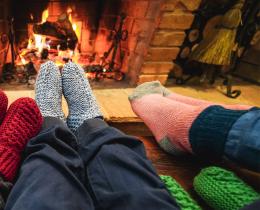Omega: What are the main messages women receive about their bodies?
Melody: Women are told that our bodies are literally who we are—that we are objects. We are seen, praised, and celebrated for our appearance or denigrated and denied access to certain resources or approval because of our appearance. This messaging is insidious and harmful. It’s a complete illusion, yet it defines our lovability and value, and defines the way in which we could be contributing to the world around us.
Omega: How can women feel more empowered to embrace their bodies?
We need to remind girls and women that the body is not real. We need to send the message that none of it is the real you. The real you is your soul. The real you is internal.
The real you isn't separate from any of the other girls and women that you see. We aren't here to compare ourselves to each other. We aren't here to criticize ourselves for the way that we are showing up for others. We're here for a more meaningful purpose than that.
We must continue to remind ourselves, to re-empower the truth of the unconditional lovability within all of us.
Omega: You are the founder of the Embody Love Movement®. What does it mean to you to embody love?
Melody: To embody something is to become it, to live it, to be so in alignment with the integrity of that value that it flows through effortlessly. Love itself is that which all of us share. It's the energy of connection between and among all of us. To live embodied love is to always hold that sacred value in mind.
We are not separate from each other. This means I matter and you matter. I have value, and you have value. I have something to contribute, and so do you. Neither of us has a more important or more necessary stake in the game of humanity. We are connected in that sameness. That's what love is. It's having that consistent grace for ourselves and for each other.
Omega: How can yoga teachers safely address body image and/or body shaming in their classes?
Melody: Number one is that no matter what the topic is, teachers must come from a place of authenticity. We must do the inner work. Teachers need to find a way to be compassionate, accepting, and kind in celebration of their own body.
Content, knowledge, and perfect cueing will fall totally flat on students if it's insincere. It can’t come from a place of, “I know this is the thing that I'm supposed to say, but I actually hate myself. While I say this thing, I'm pulling my pants up over my fat roll and trying to hide my arms because I don't like how flabby they are." We can't welcome anyone into something within themselves that we don't have to offer.
Another part is language. Be responsible for the words that you choose. Get educated around communities of people other than your own—find out what constitutes welcoming and what signals are potentially divisive, disrespectful, or hurtful. Sometimes people are coming from a place of good intentions but the impact of their words is incredibly harmful.
Be wary of any language, cueing, or attitude that even implies that there's a better or more advanced pose, along with cues that imply there's a comparison or a contest. It's not inclusive and can be harmful to everyone feeling welcome in class. There are some body shapes and sizes that aren't going to be able to do the same pose. You want to appreciate that bodies are different, not worse.
Omega: You wrote a community resource paper published by the Yoga Service Council on The Art of Compassionate Facilitation. Can you explain the idea of compassionate facilitation?
Melody: I was really delighted as a psychologist to write that paper. I define facilitation as any time we're holding space and asking for other people's vulnerability. We have so much capacity to develop as facilitators to be both compassionate with ourselves and with that process, whether we're leading a 30-minute meditation or a two-week retreat. Anytime we're asking other people to be vulnerable and we're holding that position of power for that moment in that role, we must set the conditions for safety for those in our groups, in our retreats, and in our workshops.
Compassionate facilitation really is an art. We use the tools of yoga to stay grounded and in the present moment. We do the inner work to understand where we get triggered and where we might be working out something maybe in our shadow that we're unaware of through the group. Among group members, we can be a sacred guardian of the faith.
Omega: What advice do you have for others who want to become involved in yoga service and making a difference in their community in general?
Melody: My first piece of advice is to see getting involved as an exchange—know that you are being served as much as you are in service. This view helps lessen the likelihood of burnout when you're getting as much as you're giving.
Make sure you're not duplicating services. There’s no need to go out and recreate something that's already happening. Instead do some research and see who else is already doing the thing that you want to be doing in your community. How can you be supportive of the effort that's already happening? How can you add your gifts, whether it’s your time, your effort, or your creativity?
Finally, be true to your own practices. Once we start to get in the busyness of service, it's easy to abandon our own practices. Don’t forget to set aside time for meditation, yoga practice, prayer practice, contemplation, or whatever you identify as your own self-nourishing practices. It's so easy to get pulled off-center. Stay true to the commitments that got you to the place of even being able to identify that you want to give. Stay true to those practices throughout the giving because they are what nourish you and keep you grounded in what's true.



